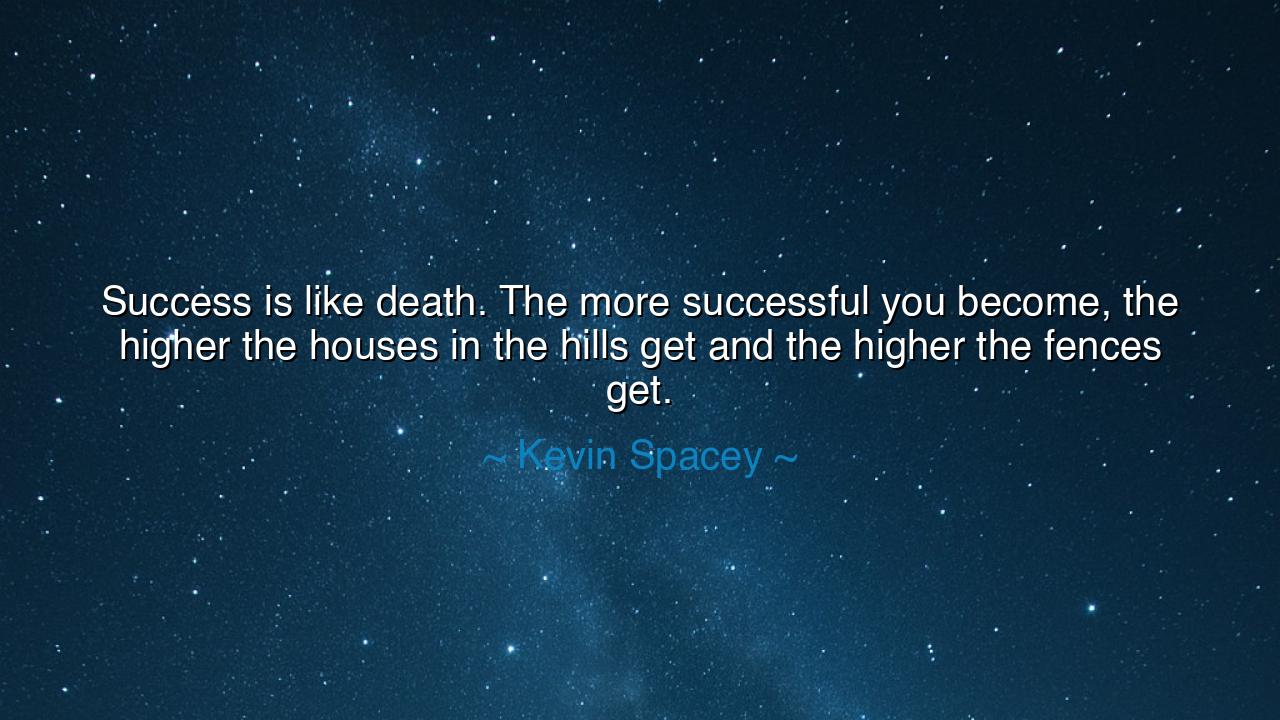
Success is like death. The more successful you become, the higher
Success is like death. The more successful you become, the higher the houses in the hills get and the higher the fences get.






In the solemn and haunting words of Kevin Spacey, once spoken in reflection on fame and ambition, we find a truth older than kingdoms: “Success is like death. The more successful you become, the higher the houses in the hills get and the higher the fences get.” These words, though born in the world of modern celebrity, strike at a wisdom that echoes through all ages—the realization that success, though bright in promise, can grow cold and lonely in fulfillment. It is a warning cloaked in poetry, a confession from one who had climbed the glittering heights only to find, at the summit, the silence of isolation.
To liken success to death is to strip away its illusion. Both, in their own way, separate the individual from the living world. In success, as in death, one is set apart—admired, perhaps envied, but no longer wholly among the common pulse of humanity. The more one ascends, the more one must withdraw. The houses in the hills—symbols of wealth and prestige—rise like tombs above the valleys below, and the fences, though built to protect, also imprison. This is the paradox of triumph: that the very walls built to preserve one’s glory become barriers against warmth and connection.
History offers us countless mirrors to this truth. Alexander the Great, conqueror of the known world, stood at the edge of India and wept because there were no more worlds to conquer. His name, once shouted by thousands, was later whispered in fear. Surrounded by generals who envied him and soldiers who obeyed him but no longer understood him, he found that power had rendered him untouchable. His victories built empires, but they also built walls around his heart. When he died, barely thirty-three, he ordered his hands to be left open in his coffin—so all could see that even the greatest conqueror leaves this world empty-handed.
In Kevin Spacey’s reflection, we hear not the boast of achievement but the sorrow of separation. His own career—one crowned with awards and recognition—brought him not only prestige but distance. As success grew, so too did the walls that separated him from the simplicity of life. Fame, he implies, is a form of exile disguised as reward. The higher one climbs, the fewer companions remain who can speak freely, love sincerely, or see the person beneath the legend. Thus, success, when worshiped without wisdom, becomes not a triumph of life, but a slow drift toward spiritual death.
Yet this truth does not condemn ambition—it clarifies it. For ambition, when guided by humility, can serve creation rather than ego. The lesson is not to reject success, but to understand its nature. It is a fire that must be tended with care: too small, and it flickers out in mediocrity; too great, and it burns the very soul it was meant to warm. The wise must learn to carry their success lightly, as one carries a lamp through the dark—not as a throne upon which to sit alone.
There is a legend of Diogenes, the philosopher who lived in a barrel, owning nothing and fearing no one. When Alexander visited him and offered him anything he desired, Diogenes merely replied, “Yes. Stand out of my sunlight.” In that exchange, the conqueror and the beggar revealed two truths: that the man who seeks the world loses his peace, and the man who seeks peace no longer needs the world. The fences that guard the powerful are the same fences that keep them from freedom; the open air of simplicity, though humble, belongs to those who need no walls.
So, children of ambition, hear the wisdom hidden in these words: seek greatness, but never let it bury your humanity. Build houses, but leave their gates open. Rise high, but do not forget the ground from which you came. Remember that the highest peaks are the coldest, and that warmth is found not in height, but in closeness—closeness to truth, to love, to the shared imperfection of humankind. Let your success be not like death, but like a tree—rooted deep, reaching wide, offering shade and fruit to others. For in the end, the worth of one’s triumph is not measured by the fences that surround it, but by the lives it touches and the souls it warms.






AAdministratorAdministrator
Welcome, honored guests. Please leave a comment, we will respond soon